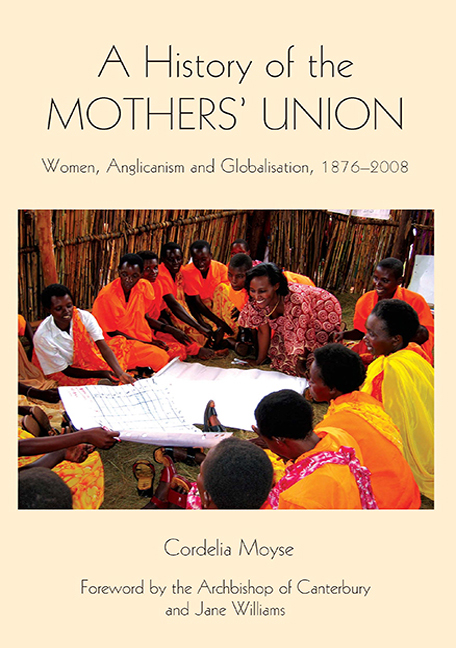Book contents
- Frontmatter
- Contents
- Dedication
- List of Illustrations
- Foreword by the Archbishop of Canterbury and Jane Williams
- Acknowledgements
- Abbreviations
- Introduction
- Part I 1876–1909
- Part II 1910–1944
- 5 Identity and Spirituality
- 6 Marriage and Family Life
- 7 Membership and Worldwide Work
- Part III 1945–1974
- Part IV 1975–2008
- Conclusion
- Appendix 1 Text of early membership cards
- Appendix 2 Development of the Mothers' Union prayer
- Appendix 3 Midday prayers (original)
- Appendix 4 Development of the objects
- Appendix 5 Biographical notes on central and worldwide presidents
- Bibliography
- Index
- Miscellaneous Endmatter
6 - Marriage and Family Life
from Part II - 1910–1944
Published online by Cambridge University Press: 29 April 2017
- Frontmatter
- Contents
- Dedication
- List of Illustrations
- Foreword by the Archbishop of Canterbury and Jane Williams
- Acknowledgements
- Abbreviations
- Introduction
- Part I 1876–1909
- Part II 1910–1944
- 5 Identity and Spirituality
- 6 Marriage and Family Life
- 7 Membership and Worldwide Work
- Part III 1945–1974
- Part IV 1975–2008
- Conclusion
- Appendix 1 Text of early membership cards
- Appendix 2 Development of the Mothers' Union prayer
- Appendix 3 Midday prayers (original)
- Appendix 4 Development of the objects
- Appendix 5 Biographical notes on central and worldwide presidents
- Bibliography
- Index
- Miscellaneous Endmatter
Summary
In addition to spirituality another key to unlocking the evolving identity of the MU as a maturing organisation is to be found in its attempts to influence public policy. After the presidency of Mary Sumner in 1909, the MU established an increasingly high profile in political and social debates concerning marriage and family life. The vision as well as the machinery that underpinned it owed much to Sumner's immediate successor as Central President, the Dowager Countess of Chichester. Sumner had shrunk ‘from touching on the sad side of life’.Chichester by contrast, with her background as a clergy wife in the gritty London parish of Lambeth and her involvement in rescue work, believed that it was precisely because the MU stood for ideals that it should engage with hardship and immoral behaviour. Under her leadership an administrative structure was created to enable the MU to act as a campaigning organisation capable of informing and rallying its membership to causes as well as communicating the MU's views to ecclesiastical and political opinion formers.
An important part of the external context in which the MU pursued its public policy goals was the granting of the parliamentary franchise to women. The 1918 act did not, however, change the MU's thinking about the essential purposes of womanhood, namely to serve God through protecting and strengthening Christian family life and marriage. Yet while the MU had not been part of the suffrage movement it welcomed the extension of what it considered the duties of citizenship. An article in the MUJ claimed that while ‘hitherto their part as citizens has been more to influence the actions of men’ the granting of the franchise involved women in ‘a tremendous responsibility … and their duties as citizens rendered thereby equal to that of men’. Articles appeared in official publications assigning to women generally, but to members particularly, responsibility for the nation's education, health, moral and religious life. Concerns included: abortion; housing for the poor; the legal age of marriage; religious education in schools; equal moral standards for both sexes; new developments in leisure such as the cinema and gambling; and opposition to divorce reform. The common assumption was that members were specially placed to further the welfare of children and women, and to these causes and many more the MU made a contribution.
- Type
- Chapter
- Information
- A History of the Mothers' UnionWomen, Anglicanism and Globalisation, 1876–2008, pp. 116 - 139Publisher: Boydell & BrewerPrint publication year: 2009



